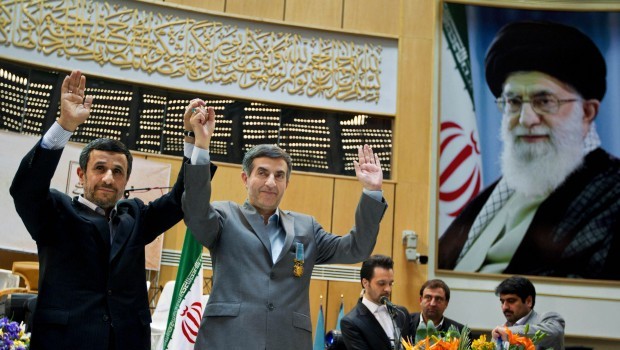
In this March 10, 2013 photo, Iranian President Mahmoud Ahmadinejad, left, holds hands with chief of staff Esfandiari Rahim Mashaei, during a press conference in Tehran, Iran. Source: AP Photo/Fars News Agency/Mohammad Hassanzadeh
Hojat Al-Islam Mohsen Heydari, a member of Iran’s Assembly of Experts, has acknowledged that the assembly is duty-bound to supervise and assess the supreme leader’s conduct. The statement came in an interview with Borhan, a Persian political website with a religious perspective.
Heydari clarified that the assembly should also make appropriate recommendations about concerns it has about the supreme leader’s conduct.
These comments are a very rare recognition by an official cleric that the leader can be fallible. Although the Iranian constitution does allow the dismissal of the supreme leader should he prove incapable of competently fulfilling his duties, the semi-official narrative has been shaped over the last two decades to portray an infallible leader. Anyone who dared to question his conduct was deemed an anti-establishment element and could be prosecuted according to the Islamic Republic’s penal code.
Heydari’s remarks do not pertain only to the present leader, Ayatollah Khamenei. In his interview, he pointed out that “Ayatollah Khomeini regretted his mistaken decision to appoint Adbol Ali Bazargan,” the first prime minister after the 1979 Islamic revolution.
According to the Islamic Republic’s constitution, the supreme leader must always be just and pious. Article 111 of the constitution stipulates that when the supreme leader loses his justness, he automatically is considered dismissed.
In the run up to the June presidential election, President Ahmadinejad is pushing hard for his favored candidate, Esfandiar Rahim Mashaei. He is continuing his support for Mashaei despite clear signals from the leader’s inner circle that Mashaei will not be confirmed as a candidate for the presidency. Over the last few days, Ahmadinejad has outraged conservative officials by lambasting them over their intention to engineer the election, thereby depriving the nation the ability to exercise its inalienable right.
Perhaps Heydari made his sensitive remarks in contemplation of what might happen if Ahmadinejad is impeached by parliament or dismissed by the supreme leader. It seems that he is trying to pre-emtively explain why the supreme leader’s previous support of Ahmadinejad should not be considered an error of judgment should there be a falling out between the president and the establishment.
